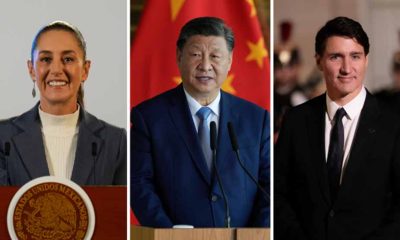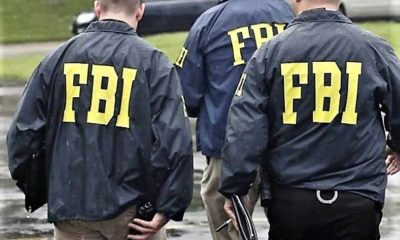International
I took a bullet for democracy, Trump says at Michigan rally

I took a bullet for democracy, Trump says at Michigan rally
Donald Trump has told a rally in Michigan that he “took a bullet for democracy” when an attempt was made on his life last week.
Attended by thousands, it was Trump’s first rally with new running mate JD Vance – and first since he survived the assassination attempt.
He told a packed arena in Grand Rapids that Democrats have accused him of being “a threat to democracy” and, to huge applause, said he was ready to “take back the White House”.
An investigation is under way into the shooting last weekend, which left Trump with a wounded ear – though the prominent white bandage he wore throughout the Republican National Convention had on Saturday been replaced by a discreet flesh-toned plaster.
Trump was not scheduled to address the crowd until 17:00 EST (21:00 GMT) but by 13:00, a line stretched for about three miles (4.8km) outside the 12,000-person Van Del Arena.
Many of those at the event, in the battleground state of Michigan, told the BBC that the assassination attempt – which killed an audience member and wounded two others – would not stop them from showing support for the Republican presidential nominee.
Some said they came precisely because of the shooting.
Unlike that rally, held in Butler, Pennsylvania, the Grand Rapids event was indoors – allowing security officers to carefully monitor who entered and to cut off threats from outside the rally.
In his speech, Trump thanked the “thousands and thousands” of people who came to see him “almost exactly” a week after the assassination attempt.
“I stand before you only by the grace of almighty God,” he said, repeating his belief that divine intervention saved him from being killed.
READ ALSO:
- A’Ibom forex broker arraigned over N2bn scam
- Fake female police inspector swindles 10 job seekers of millions of naira
- Notorious bandit Bello Turji accuses Defence minister of backing terrorism
Wendy and Steve Upcott of Clarkston, Michigan, were among the thousands who drove from all over the state to see him, many reassured by the increased security.
The couple said their 26-year-old daughter begged them not to attend the event two hours from home, fearing for their safety in the wake of the assassination attempt. But they felt obliged to come after the shooting last weekend.
“The chances of it happening again just one week to the day later is unlikely,” said Ms Upcott.
Them and many others in Grand Rapids were decked out in red Make America Great Again caps, along with cowboy hats, shirts and full outfits resembling the American flag. T-shirts with Trump’s mug shot were also for sale.
Laura Schultz said she thought about her safety on Saturday morning before she decided to come to the event with a friend.
“You can’t let fear stop you,” she said.
Other rally-goers, including several young adults, said the assassination attempt pushed them to attend the Michigan rally.
It was the first Trump campaign event for fellow Donald, a 24 year old from Grand Rapids, who wore a shirt with the viral image of Trump pumping his fist after being shot.
“This is the first event after the attempted assassination. I think it’s probably going to be the most important rally,” he said, declining to share his last name.
Donald said he had no fears for his own safety, because of the hundreds of police officers, including some on horseback.
But others said they remained scared for Trump.
“It should be a concern for most Americans that he is still not safe,” Ms Upcott said.
“He needs to be very careful,” said Ms Schultz.
Other supporters expressed outrage at the US Secret Service over the incident last week.
The agency has faced intense scrutiny after shooter Thomas Matthew Crooks was able to take aim at Trump in Pennsylvania by climbing onto a roof of a building near the rally stage, even after rallygoers pointed him out to police.
Investigators have still yet to name a motive for the 20-year-old gunman who was later killed by Secret Service agents.
Since then, the country has become more attuned to possible threats to both presidential candidates. Police in Jupiter, Florida, on Friday arrested a man for allegedly posting threats to Trump on social media, while a different man from Florida was arrested a few days earlier for allegedly threatening President Joe Biden.
Saturday’s Michigan indoor event space was much easier to secure, with metal detectors and military personnel sweeping the whole building, said former Secret Service agent Jason Russell, who has worked on campaign events at the Grand Rapids arena.
“You’ll have a pretty, pretty significant number of agents on site,” Mr Russell said, adding that they would be able to keep Trump out of view until his entrance.
This was one of several campaign stops the former president has made to the key battleground state, as polls show him in a close race against Mr Biden.
The rally came on the heels of the Republican National Convention in Milwaukee, Wisconsin, where Trump officially accepted his party’s presidential nomination and delivered his first public address since the assassination attempt.
It also marked the first time Trump appeared on the campaign trail with his vice-presidential pick, Ohio Sen. JD Vance.
Mr Biden, meanwhile, has had to pause campaign events after testing positive for Covid-19.
He continues to resist growing calls from members of his own party to drop out of the race due to concerns about his age and cognitive abilities.
Trump has for the most part stayed silent about Democrats’ drama, but on Saturday he told the crowd they have a “couple problems”.
“They don’t know who their candidate is, and neither do we,” he said.
On Saturday, the former White House physician, Dr Ronny Jackson, released a statement about his condition after having examined Trump.
The bullet created a 2cm-wide wound on Trump’s ear that extended down to the cartilage, Dr Jackson said, which is beginning to “heal properly.” No stitches had been needed, he added.
Trump’s campaign also announced that it plans to hold its next rally in Charlotte, North Carolina on 24 July at the Bojangles Coliseum.
I took a bullet for democracy, Trump says at Michigan rally
BBC
International
Canada, Mexico, China respond to Trump tariff threats
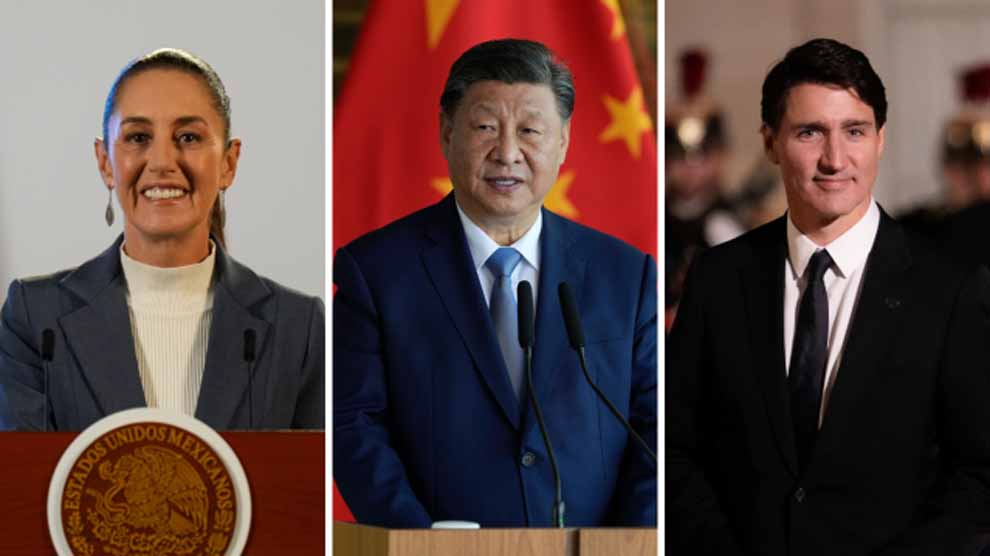
Canada, Mexico, China respond to Trump tariff threats
Officials from Canada, Mexico and China have warned US President-elect Donald Trump’s pledge to impose sweeping tariffs on America’s three largest trading partners could upend the economies of all four countries.
“To one tariff will follow another in response and so on, until we put our common businesses at risk,” Mexico’s President Claudia Sheinbaum said.
Trump vowed on Monday night to introduce 25% tariffs on goods coming from Mexico and Canada and an additional 10% on goods coming from China. He said the duties were a bid to clamp down on drugs and illegal immigration.
Canada’s Prime Minister Justin Trudeau said he spoke to Trump in the hours after the announcement and planned to hold a meeting with Canada’s provincial leaders on Wednesday to discuss a response.
A spokesman for China’s embassy in Washington DC told the BBC: “No-one will win a trade war or a tariff war.”
The international pushback came a day after Trump announced his plans for his first day in office, on 20 January, in a post on his social media website, Truth Social.
Trudeau said his country was prepared to work with the US in “constructive ways”.
“This is a relationship that we know takes a certain amount of working on, and that’s what we’ll do,” Trudeau told reporters.
In a phone call with Trump, Trudeau said the pair discussed trade and border security, with the prime minister pointing out that the number of migrants crossing the Canadian border was much smaller compared with the US-Mexico border.
READ ALSO:
- EFCC to arraign Yahaya Bello today for alleged N110bn fraud
- Court dismisses Sanwo-Olu’s suit to stop EFCC from arresting him after tenure expires
- US University opens 2025 scholarships for international students
Trump’s team declined to confirm the phone call.
But Trump spokesman Steven Cheung added that world leaders had sought to “develop stronger relationships” with Trump “because he represents global peace and stability”.
Mexico’s President Sheinbaum told reporters on Tuesday that neither threats nor tariffs would solve the “migration phenomenon” or drug consumption in the US.
Reading from a letter that she said she would send to Trump, Sheinbaum also warned that Mexico would retaliate by imposing its own taxes on US imports, which would “put common enterprises at risk”.
She said Mexico had taken steps to tackle illegal migration into the US and that “caravans of migrants no longer reach the border”.
The issue of drugs, she added, “is a problem of public health and consumption in your country’s society”.
Sheinbaum, who took office last month, noted that US car manufacturers produce some of their parts in Mexico and Canada.
“If tariffs go up, who will it hurt? General Motors,” she said.
Meanwhile, a spokesman for China’s embassy in Washington, Liu Pengyu, told the BBC that “China-US economic and trade co-operation is mutually beneficial in nature”.
He denied that China allows chemicals used in the manufacture of illegal drugs – including fentanyl – to be smuggled to the US.
“China has responded to US request for verifying clues on certain cases and taken action,” Liu said.
“All these prove that the idea of China knowingly allowing fentanyl precursors to flow into the United States runs completely counter to facts and reality.”
President Joe Biden has left in place the tariffs on China that Trump introduced in his first term, and added a few more of his own.
Currently, a majority of what the two countries sell to each other is subject to tariffs – 66.4% of US imports from China and 58.3% of Chinese imports from the US.
Speaking in the House of Commons in Ottawa, Trudeau told lawmakers that “the idea of going to war with the United States isn’t what anyone wants”.
He called on them to not “panic”, and to work together.
“That is the work we will do seriously, methodically. But without freaking out,” he said.
The leaders of Canadian provinces suggested that they would impose their own tariffs on the US.
“The things we sell to the United States are the things they really need,” Deputy Prime Minister Chrystia Freeland said on Tuesday. “We sell them oil, we sell them electricity, we sell them critical minerals and metals.”
America’s northern neighbour accounted for some $437bn (£347bn) of US imports in 2022, and was the largest market for US exports in the same year, according to US data.
Canada sends about 75% of its total exports to the US.
Doug Ford, the premier of Ontario, Canada’s most populous province, said on Monday the proposed tariff would be “devastating to workers and jobs in both Canada and the US”.
“To compare us to Mexico is the most insulting thing I’ve ever heard,” said Ford.
Ford was echoed by the premiers of Quebec, Saskatchewan and British Columbia, while a post on the X account of Alberta Premier Danielle Smith acknowledged that Trump had “valid concerns related to illegal activities at our shared border”.
The Canadian dollar, the Loonie, has plunged in value since Trump vowed to impose tariffs on Canadian imports come January.
The Canadian dollar dipped below 71 US cents, the lowest level the Loonie has fallen to since May 2020, when Trump threatened to impose tariffs on Canadian goods during his first stint as US president. The Mexican peso fell to its lowest value this year, around 4.8 cents.
Canada, Mexico, China respond to Trump tariff threats
BBC
International
Relief as Israel agrees to ceasefire with Lebanon
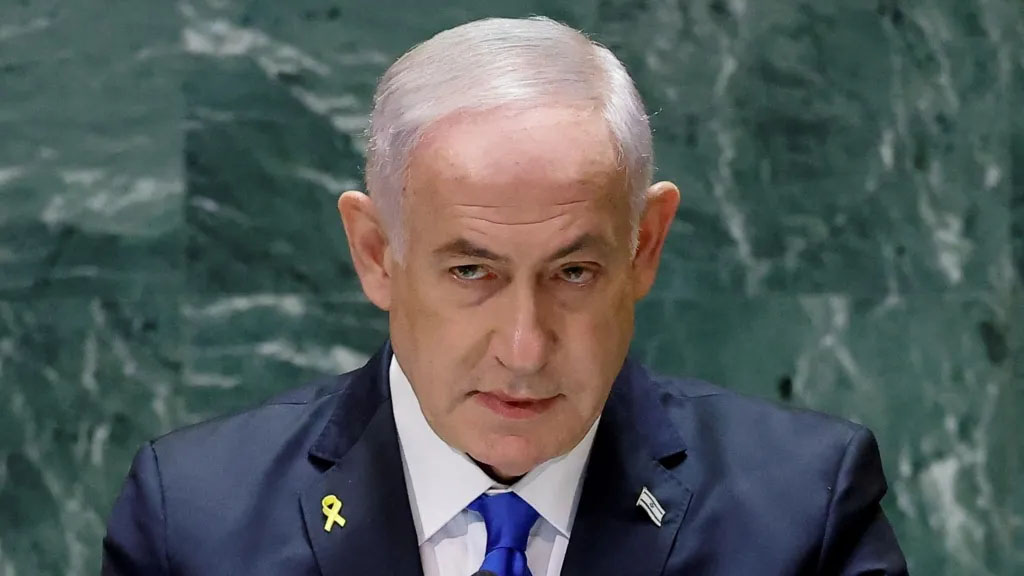
Relief as Israel agrees to ceasefire with Lebanon
Israeli Prime Minister Benjamin Netanyahu has said he will bring a US-brokered proposal for a ceasefire with Hezbollah in Lebanon to his government for approval as soon as Tuesday evening.
He said in a televised address that he would put “a ceasefire outline” to ministers “this evening”.
He however did not say how long the truce would last, noting “the length of the ceasefire depends on what happens in Lebanon”.
But it later learnt that the ceasefire would is for 60 days.
During the period, Hezbollah fighters are expected to retreat 40 kilometres from Israel’s border, with Israeli ground forces withdrawing from Lebanese territory.
“If Hezbollah violates the agreement and attempts to rearm, we will strike,” Netanyahu warned.
Key Israel backer the United States has led ceasefire efforts for Lebanon alongside France.
US President Joe Biden is optimistic the deal will lead to a “permanent cessation of hostilities”.
Biden added that the US would lead another push for a ceasefire in Gaza.
“In full coordination with the United States, we are maintaining full military freedom of action,” Netanyahu said, outlining the seven-front war Israel says it faces in Gaza, the occupied West Bank, Yemen, Iraq, Syria, Lebanon and Iran.
Even as Netanyahu spoke about the ceasefire, the Israeli military carried out multiple strikes on heart of Beirut while the army said some 15 projectiles had entered Israeli airspace from Lebanon.
Demonstrators raise placards and Israeli flags during a protest in front of the Israeli Defence Ministry in the coastal city Tel Aviv on November 26, 2024, against a possible ceasefire with Hezbollah in Lebanon. – Israel’s security cabinet has started discussing a proposed ceasefire deal in its war with Hezbollah in Lebanon, an Israeli official confirmed to AFP on November 26. (Photo by Jack GUEZ / AFP)
The war in Lebanon escalated after nearly a year of limited cross-border exchanges of fire begun by Hezbollah, which said it was acting in support of Hamas after its October 7, 2023 attack on Israel, which sparked the war in Gaza.
The war has killed at least 3,823 people in Lebanon since October 2023, according to the health ministry, most of them since September.
On the Israeli side, the hostilities have killed at least 82 soldiers and 47 civilians, authorities say.
Netanyahu said the ceasefire would allow Israel to focus on “the Iranian threat” and ramp up its fight against Hamas in Gaza.
“With Hezbollah out of the picture, Hamas is left on its own,” he said.
“We will increase our pressure on Hamas and that will help us in our sacred mission of releasing our hostages.”
During last year’s Hamas attack, militants took 251 hostages, of whom 97 are still held in Gaza, including 34 the army has declared dead.
International
Israeli strikes pound central Beirut, suburbs
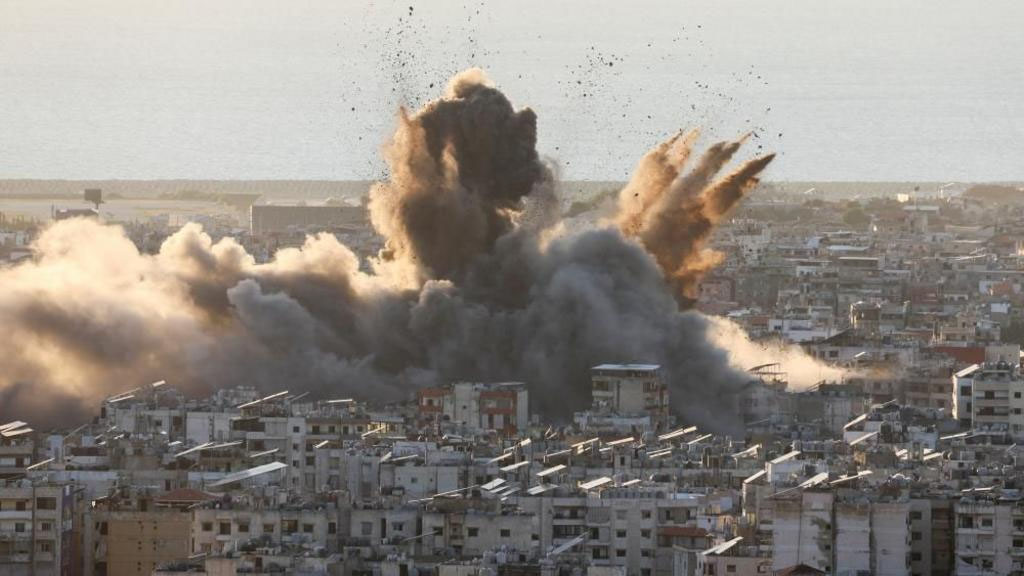
Israeli strikes pound central Beirut, suburbs
BEIRUT: Israeli strikes pounded a densely-populated part of the Lebanese capital and its southern suburbs on Tuesday, hours ahead of an anticipated announcement of a ceasefire ending hostilities between Israel and Lebanese armed group Hezbollah.
A strike on Beirut hit the Noueiri district with no evacuation warning and killed at least one person, Lebanon’s health ministry said in a preliminary toll.
READ ALSO:
- French football star, Paul Pogba’s blackmail trial begin in Paris
- French football star, Paul Pogba’s blackmail trial begin in Paris
- Vigilante arrested in Anambra for robbery
Minutes later, at least 10 Israeli strikes hit Beirut’s southern suburbs. They began approximately 30 minutes after the Israeli military issued evacuation orders for 20 locations in the area, the largest such warning yet.
As the strikes were under way, Israel’s military spokesperson Avichay Adraee said the air force was conducting a “widespread attack” on Hezbollah targets across the city.
Israeli strikes pound central Beirut, suburbs
ARAB NEWS
-

 metro1 day ago
metro1 day agoBREAKING: Port Harcourt refinery begins operation
-

 Business3 days ago
Business3 days agoJust in: Dangote refinery reduces petrol price for marketers
-

 metro2 days ago
metro2 days ago40-foot container falls on car in Lagos
-

 Politics2 days ago
Politics2 days agoLagos 2027: Seyi Tinubu campaign team releases his life documentary
-

 Education19 hours ago
Education19 hours agoUS University opens 2025 scholarships for international students
-

 International2 days ago
International2 days agoTrump to sack 15,000 transgender officers from U.S. military: Report
-

 Entertainment2 days ago
Entertainment2 days agoPolygamy best form of marriage for Africa – Okey Bakassi
-

 Sports20 hours ago
Sports20 hours agoFrench football star, Paul Pogba’s blackmail trial begin in Paris

